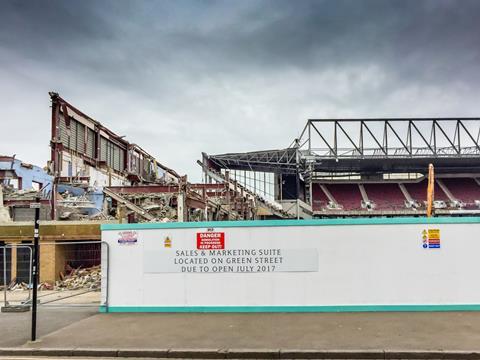The trade body’s new chief executive Duncan Rudall has had a lot to deal with in two months. He talks to Dave Rogers
“Every single person’s phone in the room lit up.” Duncan Rudall, the new chief executive of industry trade body the National Federation of Demolition Contractors, is recalling the morning when the group, in the middle of a pre-arranged board meeting at its Hemel Hempstead head office, received the long-awaited news of the fines handed out to 10 firms in the sector by the Competition and Markets Authority.
The penalties were the culmination of a years-long investigation by the agency into allegations of bid-rigging and compensation payments in the demolition industry. “The fines kept being pushed back and back and it was on the morning of our meeting [23 March] that we heard they were coming,” Rudall says.
That Thursday board meeting was followed by the federation’s AGM the very next day, so there was a lot for Rudall, who formally took up his role at the start of June – replacing Howard Button, who was in post for two decades – to take on. “It certainly pushed the board meeting on by a couple of hours,” he remembers.
But in the time since, he says, the fallout from the CMA probe has not been dominating his working days at a group which boasts nearly 140 contractor members and a further 100 industry service provider members, such as plant manufacturers.

“I’m not going to keep recapping over the CMA,” he adds. “I’m a new CEO and I will draw a line in the sand [on the issue] at some point.”
The fines are massive – corporate-changing amounts. Some will survive it and, maybe, some won’t
For now, though, he is having to deal with an issue that has cast a pall over the sector and seen the fines imposed range from more than £17m to less than £500,000. Directors were banned, too, including a previous NFDC president, former Erith director David Darsey.
In the past few months, the CMA has detailed some of the things that went on. It has proved to be eye-watering stuff.
“The fines are massive,” Rudall concedes. “Corporate-changing amounts. Some will survive it and, maybe, some won’t.”
He adds: “The CMA have dealt their hand and they’ve done quite a hefty job in doing it. Is it deserved? Well, yes, it is. They’ve [the 10 firms] done what they’ve done and the CMA has caught them. It’s as simple as that.”
He thinks those firms will, eventually, see their workloads suffer. “It will happen, 100%, but we don’t know by how much right now. They do understand it will have an impact on them, they’re not being blasé about it.
“It has been an eye-opener for clients as well. I’m sure they will look at the way they procure contracts.”
For Rudall, the issue he is dealing with could not be further from those facing the young man who, by his own admission, fell into the industry 30 years ago. Before demolition, he worked in construction, plastering and driving plant. And before that, he was a hairdresser.
His mum had a couple of salons in Totnes, the market town in south Devon where he grew up. As someone who left school with very few qualifications – “I didn’t like to turn up,” he admits – becoming a hairdresser was an obvious thing to do.
So, he swept up, washed hair and made cups of tea before becoming a trainee hairdresser on a YTS scheme, earning in the region of £28 a week.
YTS was the name given to on-the-job training for school leavers aged 16 and 17 back in the 1980s. It famously never paid well and Rudall, keen to top up his meagre wage, ended up working for a demolition contractor at weekends for some spare cash.
“I fell into it and I haven’t escaped,” he says. “I love it. It has given me a good living and enough to support my family.”

The name of that demolition contractor he worked for at weekends in between blow-dries and perms was Gilpin, a firm based in Newton Abbot, Devon, where he now lives.
We have to work hard to get rid of the stigma, but I won’t be rubbishing companies
He spent a total of nearly two decades at Gilpin before stints at Bristol-based Wring and then Hertfordshire contractor Rye, the firm which knocked down West Ham’s Upton Park football ground several years ago. “I love rugby, so knocking down a football stadium was great,” he laughs.
All three contractors are members of the NFDC – as are the 10 fined in March. Some firms, he says, have complained to him that what has happened has tarred everyone with the same brush – and that mud sticks.
“We have to work hard to get rid of the stigma, but I won’t be rubbishing companies. These things have happened and we won’t cover anything up.
“We’ve asked those companies to sort themselves out and tell us what they’ve been doing. A very harsh lesson has been learnt and, hopefully, the same things will not reoccur.”
Rudall says he has been reassured by what he has seen. He has been invited by some firms to look for himself at the changes they have made to governance and personnel in an effort to ensure the CMA does not come calling again.
But, for the 128 members not caught up in the scandal, he says the NFDC needs to make sure that it concentrates on them as well. “A lot of demolition businesses are run by really good people, who do a great job and have been caught up in it all just because they do that job.”
Some of his members only specialise in demolition, unlike some of the larger firms fined who operate in several sectors untouched by the scandal.
“One [demolition firm] said to me, ‘it’s unfair, we’re all being tarnished and my business is going to be affected’.”
We don’t choose to knock buildings down, we get asked to knock buildings down – there is a massive difference
Rudall, who is also boss of the NFDC’s training arm called National Demolition Training Group, which manages its training card scheme, is hoping the headlines don’t take some of the gloss off other changes that he says the sector is already embracing.
Originally set up in 1941, as a response to the thousands and thousands of buildings blitzed during the Second World War, the initial premise of the NFDC was for the reuse of the materials in homes, offices and factories that had been bombed out.
All rather apt, then, give the current mood and the discourse over demolition and reuse. He says the industry will have to diversify and some, by dint of their size, are doing that more quickly than others. But it is wrong, he adds, to say that demolition firms simply want to knock buildings down rather than refurbish or reuse.
“We don’t choose to knock buildings down, we get asked to knock buildings down – there is a massive difference,” he points out.
For him, demolition is not being involved enough by clients and firms further up the chain in the whole of the construction process. “Plans go in for the construction but it’s all a bit last minute for demolition. Get us involved at the beginning, the industry has always wanted to be involved at the planning stage. Include us and we can work together.”

He says demolition is too often, unfairly, seen as a dirty industry. Rudall says that is wrong. “It’s a great industry to be in, you can get very well educated, we invest in employees.”
The sector’s intake ranges from graduates to former prisoners. “People make mistakes,” he says of ex-offenders and adds firms in the sector are working with the Ministry of Justice to get them into the industry.
“They’re as employable as the next person. Why aren’t people allowed second chances? It’s irrelevant what background you’re from. Are you capable of doing the work?”
Sector workloads are currently holding up, although he is concerned that demolition contractors are still prepared to take on all-risk deals – as the term implies, all the risk is loaded onto those signing up, which seems extraordinary in this day and age.
“It’s very scary,” he says. “It’s legal, we’ve had barristers look at it it. You could lose your profit, even the business.
“You don’t know what’s in the ground for starter’s. Sometimes people sign up for all risk on asbestos [removal], which is something I would advise nobody to do. People sign up more often when workloads are low.”
We’re not construction, we work in line with them. We’re more akin to the waste industry
Like others right now, demolition firms are in danger of catching a cold from housebuilding’s woes. “Housebuilding will have a big impact and normally we would be demolishing now for next year.
“Firms have seen a slight downturn but they are not too despondent in terms of doom and gloom. We’re not in the same position as we were in 2009/10.”
He has a final point to make. Those that think the demolition sector is part of the construction industry, think again. “We’re not construction, we work in line with them.
“We’re more akin to the waste industry. We deal with waste and waste structures. We’re the binmen of the construction industry.”
From crimping to the Chiefs
NFDC chief executive Duncan Rudall admits that he fell into the demolition business in order to earn a bit more money in the days when he was a hairdresser.

The firm he gave up a comb and scissors for was Newton Abbot contractor Gilpin, where he spent a total of nearly two decades in two stints. He first joined the company as an operative in 1991, leaving 14 years later as a health and safety manager.
He rejoined in 2018, leaving in March this year as health and safety director. In between, he spent five years at Wring Group as a regional director before setting up as a consultant and training specialist in 2011.
His sport of choice is rugby union, having played hooker when he was younger. His involvement is now limited to supporting Exeter Chiefs, although given Newton Abbot’s proximity to the south Devon coast, paddle boarding is also now floating his boat


























1 Readers' comment